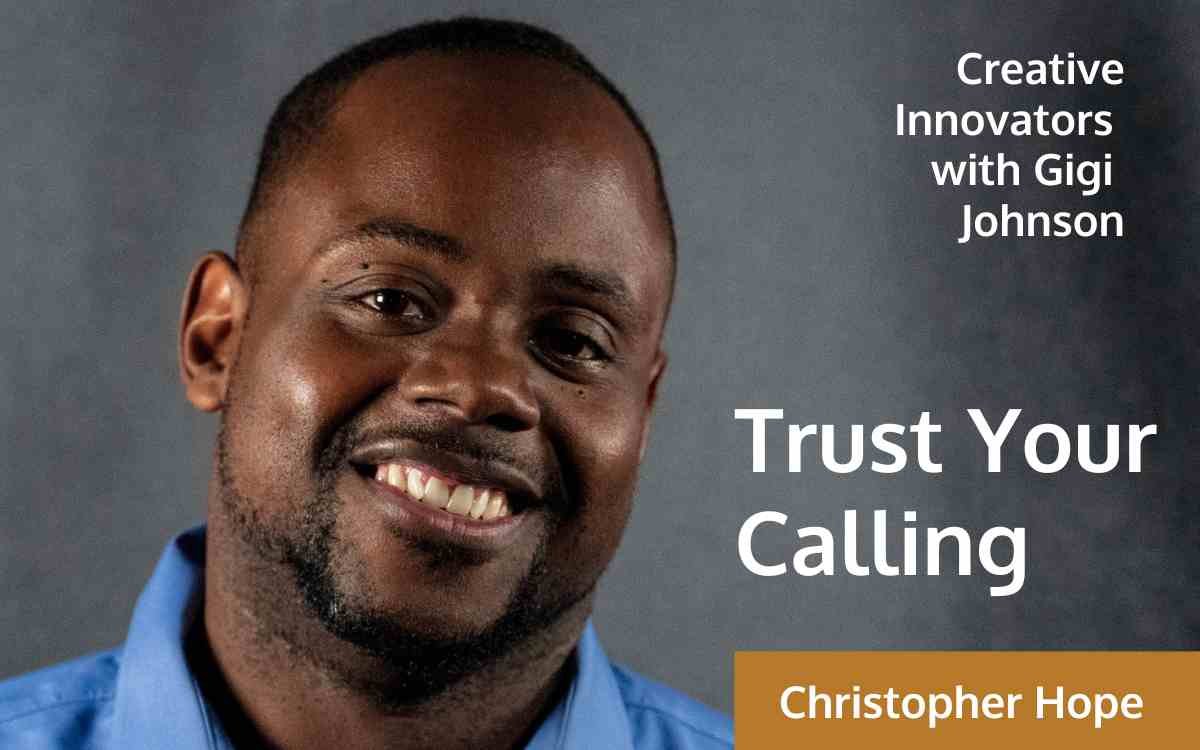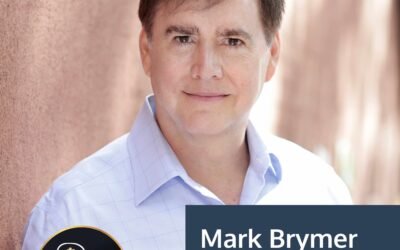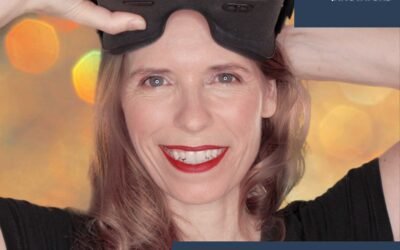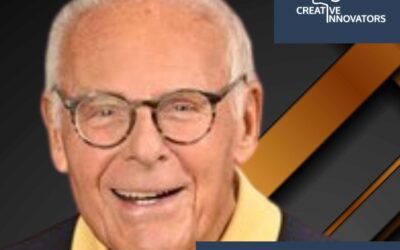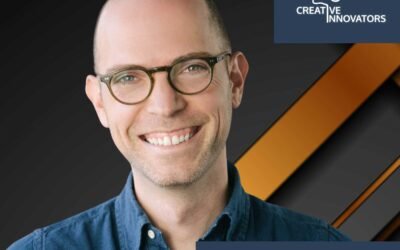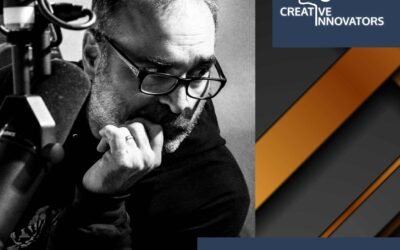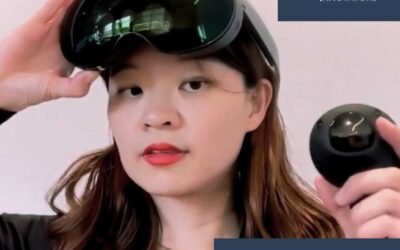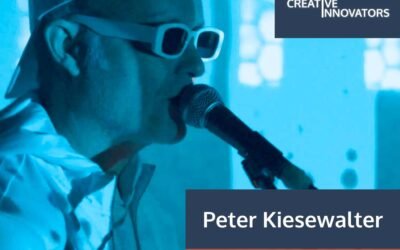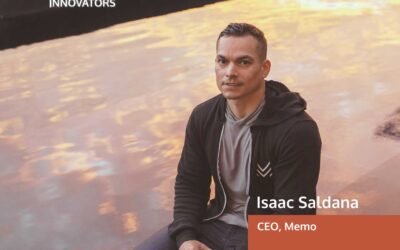Gigi Johnson: Welcome to Creative Innovators with Gigi Johnson. In this episode you will get to meet Christopher Hope. How does one meet a great creative innovator? I guess over barbecue at South by Southwest in Austin, Texas. Christopher and I met and started talking about the Loop Lab, which he runs in Cambridge, Massachusetts, and we have kept in touch as he moves this entity forward based on a really unique set of passions.
So enjoy his conversation about his driven passion about Loop Lab, but also where he sees the opportunities and challenges in being a creative innovator with both a creative background and an activism background to make a change in his creative community.
Christopher Hope: So our focus at the Loop Lab is really training women and people of color for jobs in AV and media arts fields and really connecting them to work. And so in essence, we are a nonprofit that’s BIPOC-led, so it’s mostly people of color. We specialize in providing media arts internships and digital storytelling. Our mission is really geared towards empowering women and people of color in the professional media arts to develop careers in audio video through job training and job placement.
Gigi Johnson: So you are in Cambridge, Massachusetts?
Christopher Hope: That’s correct. We are based in Cambridge. We started in Cambridge in 2017. Our co-founder, Moses Michelle, and I started the Loop Lab because we wanted to take the need for urban youth to have a creative outlet in media and in music and then really created a cool holistic program that empowers them to become more self-effective in their personal and professional lives and really works to connect them to real education and work pipelines that ultimately create opportunities that are sustainable.
Gigi Johnson: So when you say media arts, what do you mean?
Christopher Hope: So the broad spectrum of folks that are working in the professional media arts, either as contractors or even as W-2 employees. It runs the spectrum of exposing folks to everything from sound engineering, music production, sound editing, podcasting professionally, and also video production. So understanding pre-production, project management, being in the field to do video capture, post-production editing on Adobe Premiere, sending out invoices. They also learn what it’s like to be a contractor because nine times out of ten, a majority of the consultants or folks working out there as contractors, they have to have skills on what it’s like to create a proposal, what it’s like to be a W-9 worker. Those are pivotal and important skills that most of our universities are not teaching.
Gigi Johnson: How to get paid on an invoice that’s past due.
Christopher Hope: That is correct. And that is life. We do our best to really empower young adults of color and women who are highly underrepresented in the film industry as well as in the various permutations of the audio industry to be prepared to have their business skills elevated. We partner with a regional bank here in Boston called Eastern Bank, and they do a series of financial education modules that talk about personal budgeting for a project. All of these really important skills that many of the young adults we work with unfortunately just did not have the advantage of being immersed in.
And so it’s a free program. They get paid to do the program, and then after six months of hands-on training and going through the curriculum with financial education and business skills, we put them onto apprenticeships. Some of our partners in Boston include our national public radio station, WBUR. We also have a partnership with Amazon Audible, which is a major corporate partner. And we’re also strategic in developing partnerships with local agencies and nonprofits that have media content needs, such as a small nonprofit that needs a media coordinator to produce content for their Instagram, YouTube, social media, to talk about their mission and work. So these young adults are going in the field and getting that hands-on work.
In addition to this placement, we also run and operate a production studio where we hire our alumni as contractors to go into the field and do video services. We work with national organizations and local Boston organizations on several projects. It’s a way for them to get paid in the field and for us to be an employer, directly putting people of color and women in spaces where they’re highly underrepresented. It also sustains our practice because we generate almost 30% of our own revenue as an organization from the production studio.
Gigi Johnson: Christopher, are you originally from Cambridge?
Christopher Hope: No, I’m originally from Atlanta, Georgia. It’s a very different environment. However, I came to Cambridge as a young college student, like thousands of others every year. I’ve always been passionate about equity. As someone from Atlanta, the legacy of Dr. Martin Luther King Jr. and his fight for justice and equity on behalf of American-born blacks in this country has always been influential in my family and community. Both of my parents are from the North—my mom’s from New York, my dad’s from Boston—but they settled in Atlanta. So, for me, coming up as a young Black male in a very divisive time and environment, it was really important to promote Dr. King’s dream of a beloved community.
When I came to Cambridge, it’s the city of Harvard University, MIT, some of the top software companies in the country. They even call it Little Silicon Valley because of the billions of dollars in equity represented in these institutions.
Gigi Johnson: And people tend to think of Cambridge as a wealthy community as a result.
Christopher Hope: It absolutely is. There’s a lot of wealth, and you have the highest number of Nobel Prize winners within a square mile than any other location in the world. Having said that, I started really early on as a college student doing community work and began to acknowledge inequities in the city. So in a city where you have Amazon Audible, Google headquarters, and these major billion-dollar companies, you literally have a series of project developments right across the street from MIT. That neighborhood is called the Port neighborhood. Historically it has been an immigrant-based community. Now it’s mostly people from Latin America and the Caribbean. But unfortunately, many families live below the poverty line, some households making less than $14,000 a year. It was staggering to see that right across the street from so much wealth and opportunity.
Christopher Hope: When I graduated, I started doing a lot of activism—food drives, working through a church in that community called the Pentecostal Tabernacle. Huge shout out to Bishop Brian Green. Through that relationship, I became a mentor to some of the young kids and young Black and brown men and women in that community, trying to do what I could to stop the school-to-prison pipeline. Unfortunately, just like in any other impoverished community, you see a lot of crime. They have the most unsolved murders in that neighborhood than any other in Cambridge, and all the victims are young Black men. After a while, seeing this go on and on, you say to yourself: what can we do? What can I do? How can I exercise my agency to cause a difference in this community?
Gigi Johnson: Were you involved in arts and media arts in high school or in your college curriculum? What was the story there?
Christopher Hope: Yeah, absolutely. I’ve been producing music since I was 14 years old in Atlanta in my mom’s basement. I’ve always been into music. I’m a huge lover of all kinds of music. I became a DJ on the side while pursuing my education. When I was a teenager, I really wanted to be a professional rapper. I did concerts, opened up for Bow Wow at one point. I legitimately had an interest in that. But I realized that’s not where my gifting totally was. So I didn’t pursue being a hip hop artist, but it exposed me to being an artist. I still produce music for local artists. It’s a hobby now, less of a vocation, but more of a calling.
Music has always been in my life. I’ve DJed for many years and worked at local radio stations here in Boston—WMBR at MIT, WHRB at Harvard. I had a radio show called Hip Hope Radio for several years. On that show, I interviewed people like Dr. Cornel West, Ta-Nehisi Coates, Rakim, and others to really talk about hip hop culture in a dynamic way. Media has always been part of my life, my passion, my calling. I saw a lot of that passion in the young adults I mentored in Cambridge. To reach them, I would bring them to the studio during my radio show. They’d get to see how to work a control board, the research behind interviews, how to put on a radio show. For many of them—aspiring rappers and hip hop artists—it opened their eyes.
I realized if you meet people where their interests are, you can expand their viewpoint and they can see possibilities. Maybe you see yourself as a hip hop star, but it’s also important to learn sound engineering and know your way around Pro Tools. You should have those skills. And did you know there’s an entire career where you can make a living doing that? So when your hip hop career isn’t popping, you have something else to fall back on.
Gigi Johnson: So let me ask you about college. You were in Atlanta, deciding that you wanted to go beyond music. What inspired you in college? And what did you get out of that experience besides being in Cambridge and doing all this great work?
Christopher Hope: I went into college originally for my undergrad in biology. I was interested in microbiology, on a whole different trajectory. But I found myself not feeling fulfilled. I was more interested in religious studies and how religion and sociology impact our society and behaviors. I had a decision to make: do I continue pursuing biology, knowing I don’t feel called to it, or explore this other thing? I ended up exploring religious studies. After graduating with a bachelor’s at Tufts University, I pursued a Master of Divinity at several universities. I was accepted into Harvard Divinity School, which kept me in the area. It put me in a space where I could minister to people and empower myself and others. Trusting in the calling and path ultimately led me to what I’m doing now. Even though it’s not church work, it’s still fulfilling work, supporting the whole person—not just workforce development, but human development.
Gigi Johnson: When did you graduate with your divinity degree?
Christopher Hope: 2011.
Gigi Johnson: So you started or co-started Loop Lab in 2017. What was the journey from completing your degree to realizing this path? What steps did you take?
Christopher Hope: It’s funny—you often don’t know the path more than two steps ahead when you graduate. Some people are blessed with a job right out of grad school. I did, but I had several jobs. Looking back, each helped me do what I’m doing now: founding and leading a startup nonprofit social enterprise. I worked for the City of Cambridge as an outreach worker, as a minister for Pentecostal Tabernacle, as a behavioral health coordinator for a local health center, and as a violence interrupter for the city. That put me in spaces with 18–35 year olds involved in street crime, helping them access opportunities to improve their lives.
After that, I was recruited into a national nonprofit dedicated to workforce development for 18–30 year olds. I worked as director of admissions, enrolling young adults of color in finance or IT. But I saw systemic racism in leadership, and young adults being treated like numbers. It was like a glorified temp agency. Upper management didn’t appreciate my feedback, and I was told to leave. That was the best thing that happened because it gave me time to think about the next step. I’d identified the wrong way—so what’s the right way?
That’s when my mentee, Moses Michelle, and I started talking. We interviewed over 100 young adults of color, and two things came up consistently: they wanted more economic opportunity and more creative outlets. From that, the seed of the Loop Lab came to fruition.
Gigi Johnson: One of my mentors, when I was teaching at UCLA, told me that oftentimes being fired is the best thing you can do for somebody. It shows a misfit, and maybe they can blossom elsewhere. In your case, the friction in the work gave you inspiration and the economic lift to step forward. Is that something you’ve seen and share with young people—that not all jobs fit and not all activities are positive?
Christopher Hope: Absolutely. We’re preparing people for the workplace. Even though not all jobs fit, you need to do an autopsy of what happened and what you learned. For a person of color in corporate America, you’re often underrepresented. The higher up you go, the fewer people look like you. That’s a reality across the country. When mentoring young people of color, you have to empower them to stay true to themselves while navigating corporate culture. For example, being told how to wear their hair. Millennials and Gen Z don’t want to hear that. They’re entrepreneurial. They want stability but also want to create their own thing. They don’t want to follow the rules of major institutions.
What makes our program unique is that we have three outcomes. One is higher education. We partner with colleges so our program counts as credit and scholarships are available. For example, Lesley School of Art and Design accepts our program for 30 credits and offers scholarships. Benjamin Franklin Institute of Technology gives a full year of free dual enrollment. One student, Nico Manigat, did our program and theirs, and is on track to get his associate’s degree in a year for free. That’s huge.
Gigi Johnson: And not just the degree, but the skills that go with it.
Christopher Hope: Absolutely. Too often, kids come out with an AA but no practical skills. We give them a dual gift: apprenticeship, on-the-job training, certifications, and a degree. They can walk in and say, “I know my stuff.”
Christopher Hope: The second outcome is workforce. We focus on getting people into the workforce and into jobs. Not only are we placing people in apprenticeships—many of whom get hired by the company afterward—but we also hire our folks and contract them to do video work. These young adults are getting paid up to $22 an hour to do this work, which is above a livable wage in Boston. It’s an amazing opportunity for them to put money in their pockets while continuing to gain skills and build their portfolios.
The third outcome is nurturing entrepreneurship. Many of our young adults want to have a side business. It’s common for this generation to have a side gig, whether it’s their own video production, photography, or other creative business. That way, they can generate income flexibly while working a full-time job—or decide to build their own business altogether. We walk them through how to get incorporated, the different business types, and we even pay for their application. We also partner with organizations like LISC Boston, which offers grants up to $10,000 for small Black- and brown-led businesses. For example, one of our young adults, Tevin Charles, got a $10,000 grant to start a video production team and a clothing line. He just went to LA to do media work. These are the types of opportunities we open up. We guarantee an outcome as long as the student is willing and ready to work with us.
Gigi Johnson: And what you’re finding is that students aren’t just graduating—they’re starting businesses, going back to school, or working part- or full-time, sometimes combining them?
Christopher Hope: Exactly. Many of our graduates are working part-time or full-time, while also doing side photography or media work. Some go back to school. They’re playing with a mix of outcomes, but because we meet them where they are, we’re seeing great results. It’s been a winning strategy for us.
That year I met you, we were invited to the United Nations to talk about our initiative. Diplomats from all over the world told me they wanted to see this model in Barbados, South Africa, Uruguay. That really allowed us to extend our reach beyond just local. Even though we act locally, we think globally.
Gigi Johnson: What is the challenge and opportunity of scale? Because you can’t duplicate a Christopher Hope, but you’re also facing the maelstrom of COVID-19. You had a live program suddenly shifting gears. Can you talk about virtualization and the need for this beyond Cambridge?
Christopher Hope: Absolutely. Scale can be vertical or horizontal. Planning out two or three years in advance is advantageous. For me, I always start with mission: empowering young adults of color and women to enter the media arts and AV industries through training and internships. We’re not Burger King or McDonald’s—we don’t sell real estate. What we do is program. So it makes sense to make sure our program is accessible not only in Boston but potentially worldwide.
Scale could mean codifying our program and making it available online, or building capacity for instructors to teach it virtually in different schools and afterschool entities. There are many ways to look at it. But I always come back to: are we fulfilling the mission? Some of what we do is very dynamic. The internship work with young adults is harder to scale than the virtual programming we’re doing for high school students because some things in video are just hands-on. Certain skills you have to learn in a space.
These are questions our board is mulling over. We’ve already scaled from five students to thirty, and in the next three years it could be hundreds. But we want to grow wisely and organically, not get ahead of ourselves.
Gigi Johnson: So tell us about the virtual programs and how they’re working with high school kids.
Christopher Hope: Earlier this year, when COVID happened, lockdown had a major impact everywhere. For me as a leader, while acknowledging the tragedy, I also thought: where are the opportunities? For our production studio, we pivoted quickly to live streaming and broadcasting services. Nonprofits still needed their spring and fall galas, even virtually. We were hired to help them. We even offered free services to smaller nonprofits because we wanted to see them win. Interestingly, demand for our services increased 20% during COVID.
For our program, our Cambridge office could only fit five students per cohort. But when everything went virtual, we weren’t limited anymore. The cities of Cambridge and Boston reached out, asking if we could create programming for high school students since their usual employers were locked down. That opened a door. We hired instructors, even our alumni, to run those programs. So now our alumni—who graduated and are successful—are teaching younger students, continuing the loop. That’s been powerful.
Gigi Johnson: Christopher, this has been a great conversation. Thank you for sharing your journey, your calling, and the impact Loop Lab is making.
Christopher Hope: Thank you for having me. It’s been an honor to share our story.
